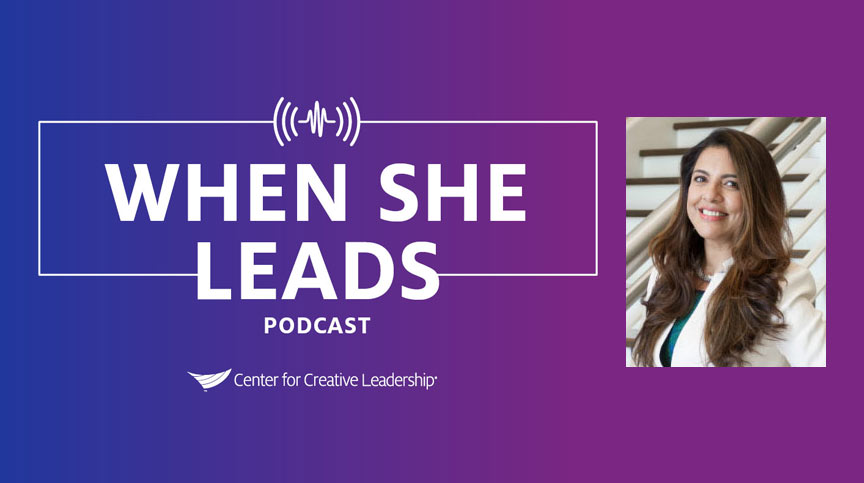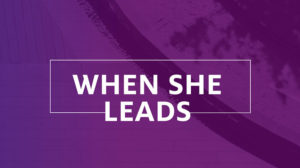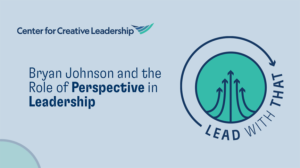- PODCAST
When She Leads: The Mother Putting People First

In this episode of When She Leads, our women in business podcast, we speak with Divya Ghatak, who talks about how she’s overcome a variety of challenges that women in business often face, what it looks like when an organization is doing gender equality well, and what helps to get more women a seat at the table. She and host Kelly Simmons explore women’s ambitions and career progression; work-life balance; talent pool diversity in the technology and venture capital industries; plus, the critical importance of mentoring women leaders. Listen now or read the full transcript, below.
Listen to the Podcast
In this episode of When She Leads, Divya Ghatak discusses how she’s overcome the challenges commonly faced by women in business. Listen now.
“I was pumping milk in all kinds of rooms and getting milk with me through airport security. It was not fun. That year was really hard. And a lot of times, people see only the success. They don’t see what you had to go through.”
Divya Ghatak
Chief People Officer
SentinelOne
Interview Transcript
INTRO:
Welcome to When She Leads, a podcast from the Center for Creative Leadership that showcases the power of women in the workplace. We’re sharing stories of inspiration and impact from executives in a range of industries and organizations around the world. These are people who are making a difference by supporting women’s advancement and development…Because we believe when she leads, it’s ultimately about better outcomes for all.
HOST, Kelly Simmons:
Hello everybody. My name is Kelly Simmons. I’m a global leadership solutions partner here at the Center for Creative Leadership, and the developer of our Advancing Technical Women’s leadership journey. And today I’m fortunate to be with Divya Ghatak, Vice President of People at Nevro, a publicly traded global medical technology company based in Redwood City, California. And she’s also a board member of Watermark, a nonprofit dedicated to increasing the numbers of women in leadership.
So thank you very much for being here, Divya.
GUEST, Divya Ghatak:
Thank you so much, Kelly. It’s indeed an honor to be here. Thank you for having me.
Kelly Simmons:
So just to get us started, would you tell us a little bit about your story and how you got involved in women’s leadership?
Divya Ghatak:
Sure. I’m happy to. I’m just very fortunate to have spent the last 25 years in the talent and people function across more than 39 countries. I’ve lived in India and Canada and for the last 16 years I’ve been in Silicon Valley. And I worked in all aspects of HR, but really my journey has been guided by 2 people who’ve been very immense in being part of where I am today. The first one is my mom who’s just been a strong role model. And I would have to say the chief instigator who started it all and always told me, “If you aim for the sky, you reach the tree top.” And she always used to say that again and again. And to my husband, who’s been very supportive. But, the one thing he’s consistently done is always encouraged me to take the harder road and the harder choice at every aspect of the time when it came to take a choice.
I love what I do. I’m so fortunate to work in a space where you’re talking about retaining and motivating and engaging talent and I thank my stars that I do that every day with a group of immensely talented people. And very, very fortunate to also have come across Watermark whose mission is to really increase the number of women in leadership. And currently, as my role as the VP of People for Nevro, I have work very actively in all these areas. So that’s just my story. I’m also a mom of 2 kids and very happy to be talking about this topic today with you Kelly.
Kelly Simmons:
Nice. Fantastic. It’s so fascinating to hear your background and you talk about role models. I think also what’s really important the kind of experiences that form your thinking and drive you in certain directions.
And so, just a quick parenthesis here. My background’s in engineering and I started my career at HP and I had never had on my mind and on my radar that I would be doing anything in those spaces of women’s leadership, even when I made a career pivot to organizational development. But, over life, there’s been a series of circumstances that kept flashing out of the corner of my eye, almost like, “Hey, there’s this topic over here. There’s a need over here. Take a look at it.”
And I’m wondering for you, in your career, what were some of those experiences that helped get you to have maybe a more clear focus on women’s leadership, just at a personal level? And that would help us understand why this is important both to you and more broadly.
Divya Ghatak:
Right. I think for me, Kelly, so many times, I think that it’s a miracle that I’m here. Because I was very interested in the profession of HR and talented people, but I really never wanted to be a people leader. I didn’t have an ambition to have leadership. And then, you go through motherhood, you go through your journey. I moved to 3 countries, just navigating my family. And it was absolutely because the mentors who came forward at every step of my life opened the doors. And then once you reach a certain level in your job, you just love the impact that you make, not only for yourself, but for your company and in the broader community. And that motivates you to aspire to do more and more, right?
And I feel that I want to pay some of that back. I want to be able to mentor women. More and more, as you know, I work with the other leaders and I work in Watermark. There was a time in my career when I was at Cisco when I was actually going to have my daughter and at the same time I was interviewing for an HR leadership role for a division of Cisco, which was going to be a billion dollars, global. And that was going to be my first global leadership role.
And I went to my manager and I said, “Wow, I was thinking of doing that, but I don’t think it makes sense because it’s really intense and all of that. And I’m going to be having a baby just as soon as I start the role.”
And she said, “You can absolutely do it. You first have to get the role, so don’t get too excited.” So I interviewed for it and I got the role. And I was 9 months pregnant when I interviewed for it and I got selected. And they knew that they’d have to wait for me to finish my maternity leave and then I came back. And then that role opened so many doors. So I think just somebody mentoring you, not only by opening doors but telling, role modeling, and saying, “This is how I did it, this is how you can do it, and it’s possible.”
Kelly Simmons:
That’s amazing just to hear. There’s so many levels there, one was being encouraged to go and apply for that role and your own internal will to make that decision. That’s fantastic. Then you go through with it. But I’m hearing another piece: the opportunity was open to you. They chose you. And the organization, whoever was the hiring team in that case, didn’t have a limitation or didn’t have a perceived limitation on, “Oh. She’s 9 months pregnant right now and we’re going to have to wait.” That’s pretty fantastic.
Divya Ghatak:
That’s right. Yeah, it was.
Kelly Simmons:
Having gone through that experience, how has that influence maybe decisions you’ve made or ways you’ve advocated or things you’ve advocated for in your other roles since then?
Divya Ghatak:
Right. I think that was just that mindset of being just open to choosing the right person regardless of their circumstances and even going a little bit above and beyond because they had to have the role… nobody in that role for 2 months til I finished my maternity leave, and I came back. So those are little things that companies and leadership teams can do. To really consider not just, I would say gender diversity, but going just a little extra mile to be inclusive so that the same opportunity set is available. And if you look at all the research about women in leadership, just when you’re having your kids is also when you’re faced with those choices. Those opportunities come to you in your thirties and your early forties. Just having that opportunity I think is important.
So we try, through Watermark and also at Nevro to first of all, educate. The education piece is so important because a lot of times people make those choices without thinking too much about the ramifications behind quick decisions they are making. When they’re not being intentional, when they’re not being fully thoughtful. So the education is a big part of the puzzle. The second part is advocacy, and the third is development. So just making sure that you’re having those conversations, you are having a culture that accepts these kinds of choices. And also, I think role modeling is a very powerful tool. A lot of times, even yesterday, I was talking to one of our sales leaders and she said, “We have women in neuromodulation group.” And she decided to go for the next level job because she just went for the meeting and she is really senior in her career. So that to me was a fascinating that it can have an impact across all levels.
Kelly Simmons:
That’s interesting. When you talk about education and role modeling, who is it for specifically and who needs it most?
Divya Ghatak:
I think women need it a lot. My own personal journey where till I could see other women who were leaders and I felt they were people like me. And our CEO here is a big advocate of it. And he talks about how he never saw himself as a CEO, and then he met this gentleman who was very much like him. He was very down to earth. He was not all buttoned up and he just thought, “If he can be CEO, I could be CEO.” So similarly for me it was like, “Oh this woman who loves to travel, loves her home and family as much as she loves her job, if she can do it, I can do it.” So I think men need it. Women need it the most, I would say.
And then a lot of times I feel when men are not educated about how critical the gender gap is, and what they lose when they don’t fully include half the population in leadership roles, and a few things that they do intentionally can completely change lives of people in their teams and across teams.
Once you educate them, they will be like, “I had no idea! I had no idea that this would be holding people back. And I had no idea that if I did these 3 things to open up the environment, I could have such a big impact on women who are in my team, or my peers, or my colleagues.” So they are very grateful to be educated. And, so I think that’s a very big part of the journey to promote the number of women in leadership and just encouraging that.
Kelly Simmons:
Yeah. And what you’re saying is that when you actually have these conversations with men, generally speaking, there’s a lot of openness. Is there anything more on that, that you would like to elaborate?
Divya Ghatak:
Yes. So I would say yes and no on the openness. So there is openness once you get them engaged in the conversation. I feel what’s a genuine barrier is having the conversation because they feel that if you want to have, like for instance, if you want to start a women in leadership program, then the first barrier is that they will tell you that “We don’t have biases here.” And “If we do make a big noise about women in leadership, what about the men?” And “What about the other minorities? Why are you so interested in gender diversity? Why not inclusion as an overall topic?” So then that whole conversation gets muted. Because you’re not talking specifically about one particular issue. And they’re not listening to what the statistics are, what the problem is, what the root causes, and how there is actually a plan to do something about it. So I feel that the biggest barrier is engaging them in the conversation and getting them to have an open mind about it.
I don’t know if you’ve experienced that, Kelly.
Kelly Simmons:
Yeah, absolutely. And I think it comes to… there’s a couple things. One is, I believe that we’re all at different phases of our development when it comes to that openness and what somebody considers open, somebody else may not. Because they’re further down some spectrum of changing beliefs or opening up belief. So you really have to meet people with where they’re at. And it can be tough, especially when you’re trying to influence change. The way that we engage people, and this you said it right: Engagement is number one. How do you make that connection? And it comes from a place of really… in our core. Being able to accept people for where they’re at, even if we don’t like where they’re at. We want to move them along or if you’d like to see them different.
Because I saw it recently with the CEO that felt that he was very progressive in his views and others weren’t. And it’s because from his lens he had big progress. But from maybe a larger broader lens, or if you see where things are in our society today in a particular part of the world, maybe not so much. So that engagement is super important. And there is this, how do we create positive contamination? Positive influence one from the other? On the other hand, in every single cohort of the Advancing Technical Women’s program we’ve had, which has been going on now for a couple of years, from the very first moment I’ve had that program, women, at least a few will approach me and say, “How do I get the men involved in this? They want it.” Or “My boss wants to be involved.”
And you see you have a little spectrum here and you realize it’s really a systemic issue and it’s really that we’re going for that larger inclusion piece. So I think it’s this challenge of almost artfully looking at your organization to figure out who needs to be engaged and how.
Divya Ghatak:
Absolutely.
Kelly Simmons:
Now you’ve worked for a number of organizations prior to Nevro. You’ve had, I think, a broad perspective in different types of organizations. You mentioned Cisco. What does it look like when organization is doing gender equality well? And what helps get more women a seat at the table?
Divya Ghatak:
The first place where it has a tremendous impact is the culture. it contributes to better results and innovation because I feel given that we are in Silicon Valley, Silicon Valley is the original diversity story. I think people from different backgrounds come and give diverse perspectives. All the research points to it. There is a lot more innovation. There is a lot more success.
I’ve seen direct, very, very direct impact on retention when I was not only at Cisco but also when I was at a VC-backed startup called GoodData, where you’re competing for top technical talent in the data analytics and AI space in San Francisco, I think we were able to make a huge impact on our attention metrics. And we were one of the few startups that talked publicly about it. Because if you see the average retention span of a knowledge worker in the startups, because there are so sought after by both big and small companies is 15 months, and ours went up to 28 months. Because there was a higher inclusion of women at all levels and certainly in leadership positions. So I’ve really seen the needle move on retention.
I think both men and women today want to be part of a culture which is seen as progressive and inclusive because people basically have, if you look at knowledge worker who’s talented, they have multiple options. And at leadership levels, and at middle levels, entry levels, the tipping point is where there is connection between your personal values and the values and mission of the company. And of course they want to innovate, they want to have impact. Those are the 3 main things. So it really is a big story about attracting talent as well. So these are some of the things that I’ve seen in a small companies, big companies, public, private, all of those, I’m definitely seeing these dynamics for the positive.
Kelly Simmons:
That’s an amazing story in San Francisco, to go from 15 months to 28 months in that kind of environment. And that lines up first of all very well with research that if you look at the quit rate for women in technology, 2/3 of women quit technology careers within 15 years, compared to 1/3 of men. So that’s like double. And everybody needs, no matter what gender you are, no matter what age you are, you’re looking at career progression. And so you need to be able to see all kinds of people going up through the ranks of an organization to be motivated to stay. So I guess if you could say, what are some of the things that happen that go against that? That you have seen be opposite of effective, let’s say?
Divya Ghatak:
Yah, I would say this, they’re not doing enough about it. The tone is changing. I think if I look back over the last 10 years, it is changing, but it is a hard road for women in technology. And I feel that getting them to a point where they can see the plus side of being in a leadership role. But you can have a way to balance your, say, your personal life and make that work like huge wide impact. Because a lot of women don’t do it for say the title or the money or whatever. But I think getting them to that point, compared to what it needs and where we have is not enough.
For instance, at Nevro, it is a very strong priority for our CEO. We are in partnership with Watermark, we are sponsoring this event, which is called Women In Life Sciences where we are inviting females CEOs, investors, some of our physicians and doctors who are involved with neurosciences to talk about their stories, to talk about what are their opportunities. And we are opening up this event not just for number of team members but for the healthcare community as a whole. Because I think it’s coming up more in the healthcare and biotech space so we are sponsoring that. Because I think, a lot of times, we think in a very limited way about our own team and about our own organization. I think you definitely need to do that within the company, but you need to make it as broad as possible because the societal impact we have will influence our talent pool, will shape the thinking, will just encourage women to pursue the hard road. And to provide them, I’m sorry for repeating this, providing them the role modeling.
Because if you compare what the statistics are in a tech and Kelly you know these numbers better than me, but you have less than 20% of women in manager and above roles. And even lesser and lesser as you reach the C-suite and hardly any representation at the board level. So that is where people need to see the urgency of it and do enough things to move the needle in an authentic way. Not just saying that, “Hey, we are diverse, we do this,” but really being open, opening up and talking about statistics. And saying, “Okay, where are we?” And you need to encourage it in your customer communities, in your industry communities, and certainly in your real communities.
Kelly Simmons:
Absolutely. On one hand, I’m hearing you say, let’s bring in these leaders from different organizations for people to meet them. But you’re also saying let’s create an industry wide group of people that’s trying to hold itself accountable maybe for raising the bar. Would you agree with that?
Divya Ghatak:
Yes, absolutely Kelly. Absolutely. And the other part of it is that let’s not trivialize how hard it is. Like what are the real challenges? So at GoodData we started setting up these groups where you would… women would just share their life stories and their journeys. So the very good example I shared that I took that lovely job when my daughter was 2 months: It meant that I was pumping milk in all kinds of rooms and getting milk with me through airport security. It was not fun. That year was really hard! And a lot of times, people see only the success. They don’t see what you had to go through. Even though I have a great relationship with my husband, but imagine negotiating through all of that and childcare and costs and how do we afford it.
And it is not pretty. So to be able to tell somebody who’s looking up to you and saying, “You look so put together and you’re so successful.” And I said, “A lot of times I’m a hot mess. I’m not perfect. I’m struggling too with many things in life.” But you work through it because you love your kids, you love your job, you love the opportunity you have and you just try every day. And maybe things fall apart some days. And that is the real truth. So making it real for people is also important. And for women. So it’s not a rosy picture. It’s not that, “I’ll ask for the bigger role and everything will just work in my favor!” It won’t.
Kelly Simmons:
And I laugh because I remember never forgetting during undergraduate sitting in a room and it was a conference of the Society of Women Engineers and it was a vice president from Hewlett Packard speaking and one of the questions came, “So how do you do work-life balance?” And she says, “You don’t.” And that’s exactly what you’re saying. And you that was more than 20 years ago. It’s almost as if there’s a need to continually support ourselves on that journey as we need a bit of camaraderie when you are running through airport security with breast milk in your case and have you done make up all kinds of decisions and live through the parts that are less, let’s say, attractive on the outside.
When you say “we’re not doing enough,” and so there’s so many different pieces to it. There’s the importance of focusing on inclusion in hiring practices. There’s looking across our industry and maybe looking at what policies we have that make it easier for women to hold careers, start families, and accelerate their careers. And then there’s that kind of policy work. Then there’s that motivation that we need to do and the mentoring of women themselves to be more courageous, to go for things where they might not have that same level of intrinsic ambition as their male colleagues do. Do you see them all as a team of equals that need to be going in parallel? Do you rank order them in a priority? How do you see that?
Divya Ghatak:
I would say that if I were to prioritize, I think the role modeling and mentoring is the most important. I think creating ideas where people can see on a very real basis what that looks like. And you know how the road is not perfect, but if you want to pursue it, there are many rewards. We’re partnering with organizations like Watermark and others where they have set programs where they can come in and do development workshops. They organize more than 52 events in a year and many of them are massive. And then you can just provide through that partnership. We just provide that to all our Nevro team members. I did that with GoodData as well. So there are many.
I think exposure and advocacy is equally important I would say. But I think it starts with that conversation where you say, “You can do it and you have the capability, and this is why you should do it, because you can have this sort of an impact. And you can make a difference.” So I think that conversation is the most, I would rank order that the highest I believe.
Kelly Simmons:
How have you seen men get involved to support of partners or be instrumental in affecting change in your industry or organization?
Divya Ghatak:
I think there are men getting more and more involved in it. So Watermark has actually started the leader annual awards, which are for women who have actively helped increase the number of women in leadership. And then as a board, we met and we decided that we should have one, include the men in the awards as well. So reward them and recognize them for increasing the number of women in leadership. And our CEO got the award this year as the man who gets this award from Watermark. And what he has done is, if you look at our leadership team, 33% of them are women, 23% of our directors are female, 51% of our managers are female. And being open and sharing those.
But also he set up the Women Neuromodulation Network. So we call it the Women’s Neuromodulation Network where we include our customers who are female brain practitioners, which includes neurosurgeons, anesthesiologists, and other physicians.
It includes people from the company and certainly fellows and we bring them together once a quarter. They come and talk to each other. And because they are physicians, they don’t belong in a company. So there are many cases where the first time they’re sitting in a room of 30 or 40 women and they are talking about how their mom encouraged them to be a doctor and what that meant and what it meant for personal life choices. So the first time we did that for them, there were many people who had tears in their eyes.
And they had never had that experience. They never had that community of women. These are neurosurgeons who had been in the OR the only woman with these male neurosurgeons. And it is the same everywhere. By the way, these challenges are same in tech, in neurosciences, in India, in America, every day, same issues.
If you look at the VC industry, they are waking up quite a bit as well. So our board members were certainly, you know, when we were looking at talent pool for our top executive roles, they would always want to see diversity in it. And I think it’s really good when your board is asking those questions. And just holding leadership teams accountable. So I think that is also a very positive development.
Kelly Simmons:
Sounds fantastic.
Divya Ghatak:
And I just want to add this, I think a lot of times it’s at the grassroots level. We had a talk where we had a female technical and a engineer who had a great leadership career. And we invited some men to it. And the men were like, the experience was transformational for them and then they actively encouraged it. And these are first level managers. But that had such a big impact on the talent pool and the talent pipeline within the organization. So at all levels it can be really powerful.
And I would say the other real impact is that the talent pipeline We had this female engineer and because of all the programs we did at GoodData, today is a senior director within 3 years. And she can be hired by anyone. Like I think any big technology company like Google or Facebook would absolutely want to hire her. She continued to stay at GoodData because she got that mentorship and she’s still there. And I’m still in touch with her and she’s done really well at a very, very young age in her life because she was part of that talent pipeline that was actively nurtured.
Kelly Simmons:
That’s fantastic. And I think one of the things that I look at personally when I do this work is, how do we create a ripple effect? And as soon as somebody gets something for themselves and they find them taking new steps that maybe they wouldn’t have taken or even just having a mindset that they didn’t have before to produce a different outcome, then they want to share that with others. And it sounds like through a number of these efforts, you’re setting up these ripple effects so you have to keep investing in it. But the spread goes beyond the impact on any one person directly involved.
Divya Ghatak:
Absolutely.
Kelly Simmons:
What is your, I’d say, hope for the future? What would you want to see, maybe over the next 5 years (even though that might be a long timeframe to look at Silicon Valley!), but what do you expect to see in the industry over the next 5 years?
Divya Ghatak:
I want to see a change for the better. I want to see more representation of women at the highest levels. I want to see a much more active talent pipeline. I don’t want to see these statistics where you have near equal representation at when the women are entering the workforce. And then you see that complete narrowing, to almost whittling down, of the talent pipeline as women choose to go away from technical careers. I want people who have misogynistic views not to be tolerated. Even if they are technically or business-wise very successful, I want to see less tolerance of that. There are too many examples today where we are tolerating people who are technically very successful and very successful from a business perspective just do things which should absolutely not have any tolerance level. And I see it in the best of companies.
And I want women to feel that they can succeed as their whole selves. That it’s not the choices that are there for us. So from the time we enter the workforce, to choosing a career, to choosing your partner, to choosing where you live, and how you live and what you do. Those should be the same choices a man makes as well. More and more.
And women should be less alone. And I think the one thing that I’m very encouraged with, and I see this as more of a social phenomenon, I have seen women come together socially a lot more. Enjoying each other, supporting each other, and having fun. And I think that is going to have a huge impact because you do need that emotional support and that strength. So I’m very encouraged by that.
I’m very encouraged by the education that is happening with boys at a young level, so that as they’re forming their mindsets, they are hopefully going to make different decisions than what is leading to the outcomes we have today. So I’m really hopeful.
And I really want to have a call to action of anybody who’s in a position of leadership to spend their time in making that change by educating, by taking the time to mentor women, by connecting with networks. I think just making that possible. I think if each one of us who is in a leadership role or a position of influence spends 10 to 15% of their time setting this intention and fulfilling that intention, we can make real change in our society, in our communities.
Kelly Simmons:
I love that metric: 10 to 15% of our time where we just say mentoring and developing others. That’s what we’re always telling our managers that if you want to build your organization, you can’t just be focused on managing people to get work done. You need to actually shift the time spent. And they look at you like have their eyes open like how do I do that? Well, it comes down to time and priority.
Divya Ghatak:
Exactly. It’s what you set your intention at. There is a beautiful book I read once. It’s called The Art of Racing in the Rain. I don’t know if you’ve read it. It’s a very lovely story. But the one thing he talks about is the car goes where the eyes go. So as a race car driver, your car goes where your eyes go. It first starts with where your intention is set. And I think I would really encourage our leaders today to make an active intention and make that change, which can really lead to such a wonderful impact.
Kelly Simmons:
Thank you very much for that. I think we’re actually getting to the closing time of the podcast and you’re getting to the kind of call to action that I was wondering about, with what you would recommend for both leaders but also women starting their careers. So I hear the one message really on one hand even to leaders really about setting an intention, an intention around inclusion. Is there anything else you would like to add or any advice for women starting their career today?
Divya Ghatak:
Yeah. I would absolutely tell them that beyond anything, find the determination and the intensity to follow your dreams. Your dreams are important. What do you want to do with your life? The intentions you have are important but they need to be followed through with a tremendous amount of grit, intensity, and a personal drive. Seek the strengths from your family and your friends and take that first step forward. And you will be surprised by taking that first step forward how many people will come out of the woodwork to support you and they will fight for you.
But most importantly, you need to respect yourself and your own dreams and fight for it and put the work behind it and put that first step forward. Don’t worry about all the statistics and everything that’s there. You need to take that first step and give it your wholehearted effort and determination and seek those supportive networks and all your dreams will come true. In fact, they will come true more than your wildest dreams. I think where I am today, and if I look back and think when I was in college, would I be able to achieve all this? I wouldn’t have thought of it in my wildest dreams. But I think it’s about taking that first step forward and following it through in a whole hearted manner.
Kelly Simmons:
That’s wonderful. I’ll take that message home too. Thank you so much, Divya, for spending time with me today. We look forward to continuing the conversation.
Divya Ghatak:
Thank you so much, Kelly. It was wonderful talking to you.
Guest featured in this episode of When She Leads:

Divya Ghatak is an active board member of Watermark, a community of executive women who are building networks to help more women in business accelerate their careers. Divya has built her career in HR leadership positions at a number of tech companies, including Cisco and Good Data. When we spoke with her, she served as the vice president of people at Nevro, a global medical technology company. She was recently named Chief People Officer at computer & network security firm SentinelOne.
Host of this episode of When She Leads:

Kelly Simmons is Global Portfolio Lead for organizational development solutions, based out of CCL’s San Diego campus. She oversees the design and delivery of custom leadership solutions for our global corporate clients, and was lead faculty on the design of our Advancing Technical Women program. She also recently coauthored Beating the Odds: Winning Strategies of Women in STEM.
| What to Explore Next
| Related Solutions
Sign Up for Newsletters
Don’t miss a single insight! Get our latest cutting-edge, research-based leadership content sent directly to your inbox.







